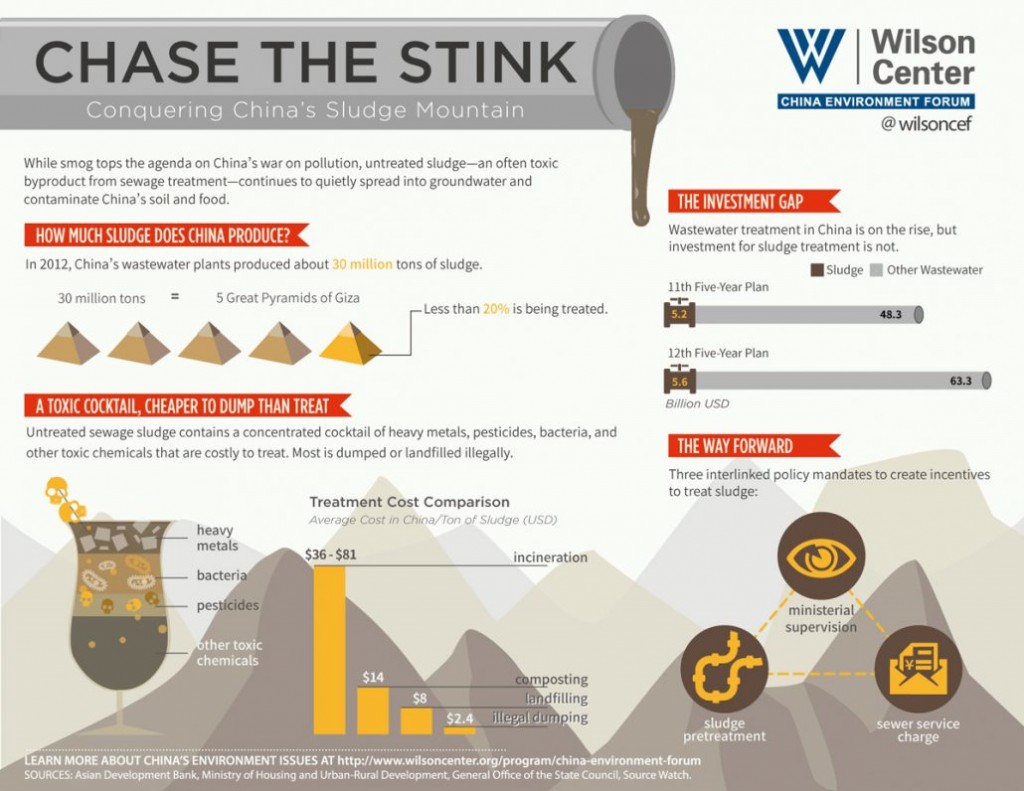Cities across China are finding success in turning sludge — the stinky slurry that’s left over when wastewater is treated — into clean energy. It’s a movement that’s both producing electricity from waste, and helping solve China’s overcrowded landfills, according to an in-depth report from the Wilson Center’s New Security Beat blog.
Many cities are being inspired by a successful sludge-to-energy plant in the city of Xiangyang, the report says. Hefei is now experimenting with the technology, and other cities including Beijing, Chengdu, Changsha, and Chongqing are now working on their own plans for sludge-to-energy.
In the past, cities have tried to build sludge incinerators, or to use sludge byproducts as a fuel in coal-burning power plants. But those are not long-term solutions; they’re expensive and also take a lot of energy to dry the sludge enough to be able to burn it.
Xiangyang had tried, and failed, to turn sludge into compost. Then, in 2011, a waste-to-energy company called TOVEN convinced city officials to convert sludge to energy. A plant was built, and it’s been a success, the Wilson Center report says. The plant is producing clean energy , it reduced the huge piles of sludge that had built up, and it’s also now treating both wastewater sludge and food waste from area restaurants.
On an average day, the plant takes in “several hundred tons of human excreta and other waste” and produces “enough clean energy to fuel 400 cars,” the report says.
Other clean-tech and renewable energy news out of China recently:
Dalian Peninsula to House World’s Largest Battery
China is about to become home to the world’s largest battery, Engineering.com reports. The 200 MW (800 MWh) vanadium flow battery is intended to provide peak shaving, grid stability, load management and emergency power to northeast China’s Dalian peninsula.
The battery is being produced by Mukilte, Washington-based UniEnergy Technologies in partnership with China’s Rongke Power. It’s expected to be fully operational by 2020, when it will provide up to 8% of the region’s peak power. The plan is for the local utility to purchase less-expensive energy during off-peak times, then use the stored energy during costly peak demand times.
Beijing to Build Large Underground Wastewater Recycling Plant
China’s capital city is building a 31 hectare underground wastewater recycling plant. Water treatment company Xylem has won a contract to help build and equip the plant, Xylem announced.
The new plant is intended to ease sewage treatment pressure in southern Beijing and to improve the water quality of the Liangshui River. Because it will be underground, the new plant will reduce land occupancy and also not emit noise or odors.
The facility will use four bioreactors, each 160 square meters in size. It will treat wastewater until it’s suitable for landscaping, industrial, municipal and other uses, Xylem says.
Chinese Company’s Battery Packs Win Praise from FT and IFC
Chinese company Microvast’s efforts to bring battery power solutions to the electric vehicle industry have won high praise from the Financial Times and the International Finance Corp. The company was the overall winner of the FT/IFC’s 2016 “transformative business awards,” announced earlier this month.
Microvast battery packs have been installed in more than 10,000 electric buses, mostly in China but also in four European countries. The company’s latest development is MVPACK, an ultra-fast charging battery pack designed for use in cars. The MVPACK “is expected to encourage and contribute to the mass adoption of affordable electric vehicles, and the long-term electrification of urban transport systems,” the FT and IFC said in making the award.
Microvast “is transforming the public transit sector in one of the world’s most polluted and densely populated countries where renewable energy solutions are in big demand,” the FT and IFC said. “If rolled out globally, this approach could play an important role in the fight against climate change.”
Microvast opened a commercial, ultrafast charge, electric bus charging station at the Chongqing International Airport New Development Zone in 2012.
In 2011, Microvast raised $50 million in funding from IFC, a member of the World Bank Group, and investment manager Ashmore Investment Management Ltd.
